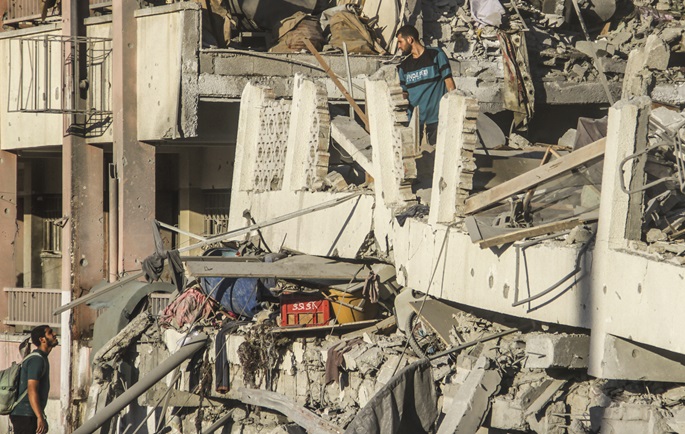Satellite surveillance shows 63% of Gaza buildings damaged: UN
Published : 06 Aug 2024, 03:56
The latest UN analysis of satellite surveillance covering the Gaza Strip showed 63 percent of structures in Gaza have been damaged, UN humanitarians said on Monday, reported Xinhua.
The UN Office for the Coordination of Humanitarian Affairs (OCHA) said the UN Satellite Centre analyzed data collected a month ago.
OCHA said bombardments and hostilities in Gaza continue to kill, injure and displace Palestinians, damaging and destroying homes and infrastructure.
"In just the past 48 hours, three schools sheltering displaced people in Gaza City were reportedly hit, resulting in dozens of casualties, according to Palestinian civil defense," OCHA said. "Partners on the ground are assessing the needs of people who fled and have been providing assistance."
The office said the Israeli military issued a new evacuation order for people living in areas of southern Khan Younis and northern Rafah to move westwards to Al Mawasi immediately. Humanitarian partners tracking population movements in Gaza estimated that more than 11,000 people live in the areas affected by this evacuation order.
OCHA said initial mapping indicates the area encompasses about 18 square kilometers with more than 40 displacement sites, 12 schools, two functioning medical points, and nearly 20 water and sanitation facilities.
"We call once again for all parties to the conflict to respect their obligations under international humanitarian law, including by taking constant care to spare civilians and civilian objects," the office said. "This includes allowing civilians to leave for safer areas and allowing their return as soon as circumstances allow. People must be able to receive humanitarian assistance, whether they move or stay."
OCHA said that as the violence continues, the humanitarian crisis in Gaza deepens.
"Our partners reported a surge in malnutrition cases among children in northern Gaza last month," the office said. "They noted a more than 300 percent increase in July -- when more than 650 cases of acute malnutrition were diagnosed -- compared to May, when 145 such cases were detected."
OCHA said its humanitarian partners reported nutrition conditions are worsening due to access constraints, shortages in essential supplies, limited availability of fresh produce and meat, poor water and sanitation services and spreading disease.
"For example, acute supply shortages meant that just 8 percent of the nearly 50,000 children whom our partners had been aiming to reach in northern Gaza were able to receive those supplies last month," OCHA said. "Improving humanitarian access is urgent to ensure that children, as well as pregnant and breastfeeding mothers, get the support they need."


